Movie Review – Call Of The Wild, The (1935)
Pared back version of Jack London’s popular book focuses more on the humans than it does the central character – Buck, the enormous St Bernard – and is a nice catalog of Yukon-centric locales; while the story slips in and out of comedy and drama too often for my liking, the combo of Clark Gable (proving why he was a popular leading man of the day), Loretta Young (woot woot!) and Jack Oakie’s comedic stumblings add up to a terrific little time filler that offers some nice character moments.
– Summary –
Director : William Wellman
Year Of Release : 1935
Principal Cast : Clark Gable, Loretta Young, Jack Oakie, Reginald Owen, Frank Conroy, Katherine DeMille, Sidney Toler, Charles Stevens.
Approx Running Time : 90 Minutes
Synopsis: After learning of an unclaimed gold find deep in Yukon territory, two men and a woman set about trying to find it, before a villainous British colonial gets there first.
What we think : Pared back version of Jack London’s popular book focuses more on the humans than it does the central character – Buck, the enormous St Bernard – and is a nice catalog of Yukon-centric locales; while the story slips in and out of comedy and drama too often for my liking, the combo of Clark Gable (proving why he was a popular leading man of the day), Loretta Young (woot woot!) and Jack Oakie’s comedic stumblings add up to a terrific little time filler that offers some nice character moments.
**********************
The Call of the Gold.
Anyone who stepped into this Clark Cable-starrer expecting to see some adherence to the original novel would have grounds to be disappointed. This version of Jack London’s classic novel removes the vast majority of story-lines, in order to capture a vague essence within a brief 90 minute running time. Book-to-screen adaptions have always been tricky business, and had I some vested interest in seeing the original book given a more literary rendition cinematically, no doubt I’d be disappointed with this film as well. But I really liked this one, I really did. Whereas London’s book was a story about a dog, Buck, William Wellman’s version jettisons a lot of that element and centralizes itself on the human factor, particularly Jack Thornton, played by Gable. In the removal of a lot of the Buck back-story, the film loses most of its titular “call of the wild” mythology, making way for a more perfunctory straight-up adventure yarn, but in all honesty it does little to prevent this film from being a good ‘un in any case.
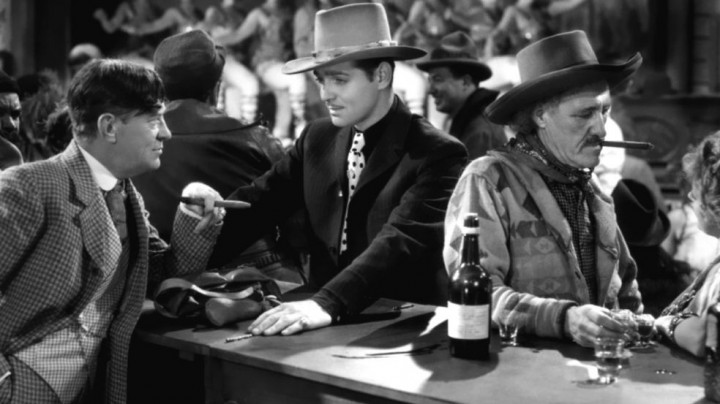
Plot Synopsis courtesy Wikipedia: A prospector, Jack Thornton (Clark Gable) heading for the Alaska gold fields loses most of his money gambling. His luck changes when he pays $250 for a sled dog to keep him from being shot by an arrogant Englishman, Mr Smith (Regineld Owen), who is also headed for the Yukon. The prospector and his friend, Shorty (Jack Oakie) head off for the Yukon with a map showing the location of a major gold mine. Along the way, they rescue a woman, Claire Blake (Loretta Young) whose missing husband, John Blake (Frank Conroy) owned the original map. After the dog wins them a thousand dollars used to purchase supplies, the three continue north in search of the gold mine.
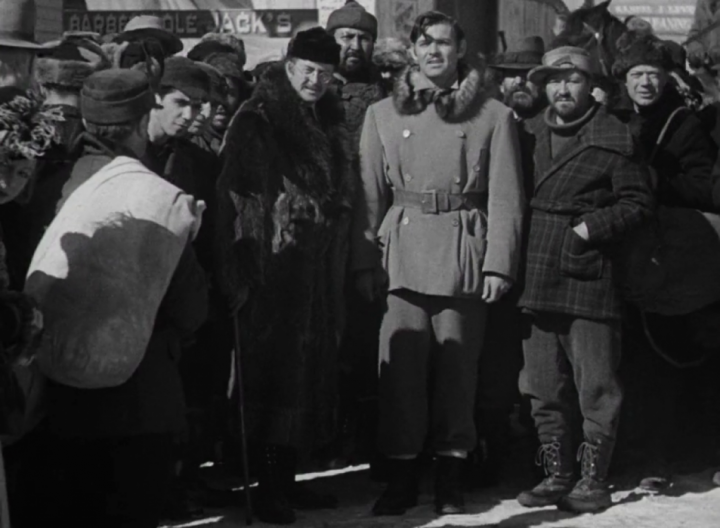
Ahh gold. It drives people crazy. The Call Of The Wild is set in 1900 Yukon, Canada, at the tail end of the great gold rush in that region; in the film, prospector Jack Thornton goes through his last lot of money as the blackjack table, losing almost everything. While for most people this would be a problem, apparently Jack has that carefree, happy-go-lucky personality that allows him to get about life with a smile on his face, even when things look down. His bud, Shorty, is a whimsical clown, always out of a jape or a jest, yet resourceful and loyal. Together, you get the sense that they make a good team, until Loretta Young’s Claire Blake arrives on the scene. The quest for riches in the most inhospitable of landscapes, such as that depicted in The Call Of The Wild, seems utter insanity, but then vast wealth could be accumulated by a prosperous claim being staked in a valuable piece of land.
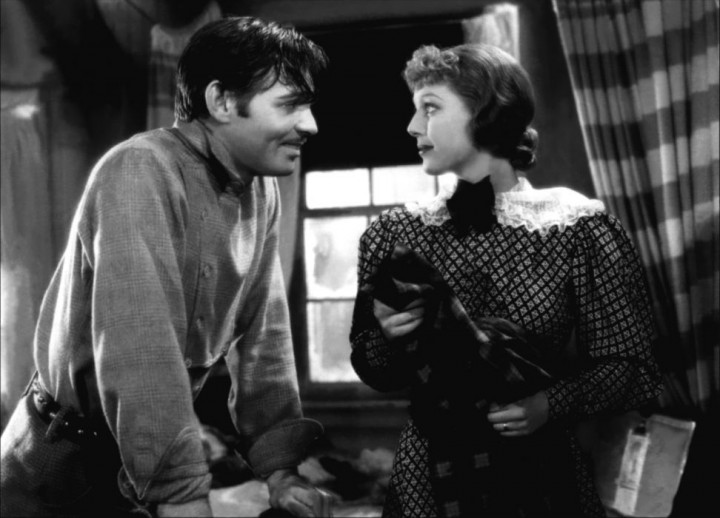
The Call of The Wild’s script was written by Gene Fowler and Leonard Praskins, and it strips London’s novel down to a single element of the narrative, with Buck and Thornton, together with Shorty and Claire, questing through the frozen mountains of the Yukon for gold. The script shines thanks to the performances of the three key leads, particularly Oakie, who has that larrakin, Jim Carrey-esque style of slapstick comedy about him, although Clark Gable’s character is the most heavily invested in terms of development. I say development, but there really isn’t any such thing in a film of this nature, with such a short running time. Simplistic characters worked best for this period of cinema, giving Gable and Young, whom in reality had an illicit affair during production (Young gave birth to Gable’s child, even though he was married at the time, shortly after completing work on this film) less time to really build on the romantic angle the film has going for it.
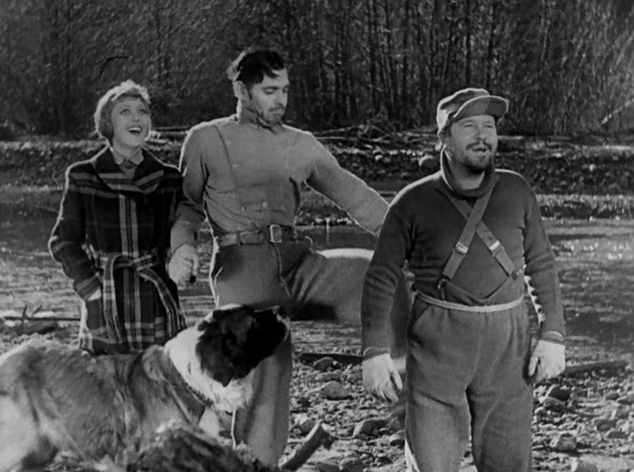
While I thought the Thornton/Blake connection a little hard to swallow – if only for the fact that Claire’s attitude turns from ice-queen to snow-princess in a matter of moments in film time – the actors all give a great account of themselves. Gable – and by God I wasn’t expecting it – the man is a screen icon, and it’s little wonder based off this film; he looks and sounds terrific in almost every frame, as believable and as honest a performer as you’d see even today. There’s not an ounce of Hollywood to be seen on him here, although his dashing good looks and sublime voice ensure that everyone swoons whenever he’s on the screen. Loretta Young, meanwhile, is gorgeous in that old-time 1930’s way, and even though she spends a great deal of time rugged up against the Canadian snow, the moments Wellman has to show her off he does, making the most of her feminine charms. A down-blouse shot towards the end of the film, after she’s been dunked in the water, is a particularly racy moment considering the era of the film, and even moreso the period of the story.
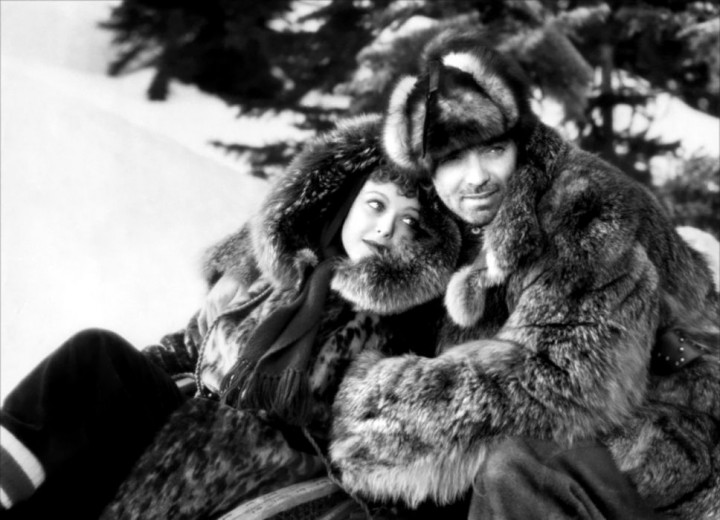
The story’s attempt to fashion a relationship between Buck, the large St Bernard, and Thornton, a large man in his own right, is mishandled, I thought. Buck’s a temperamental beast who would soon bite you as look at you, and Thornton’s mysterious “bond” with the animal isn’t handled with any sense of mythos – it’s just there, and that’s it. That and the fact that Buck saunters off to dally with several wolves later in the film, a key component of London’s book, almost feel like a begrudging factor of the story the filmmakers had to include, rather than an organic, inclusive element.
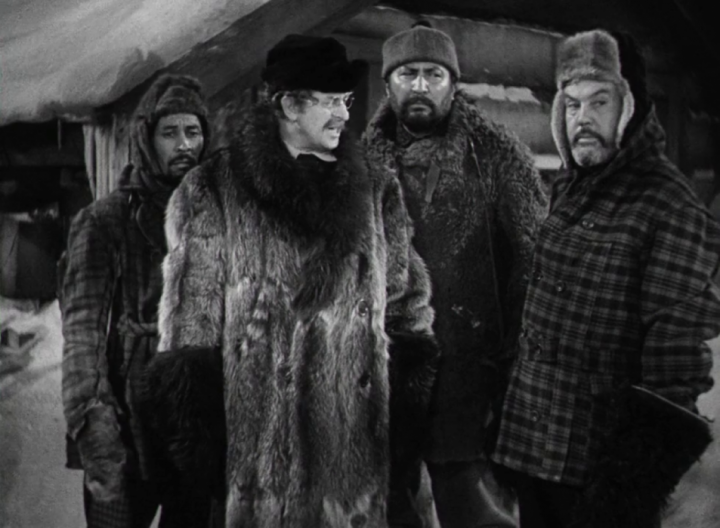
William Wellman’s direction is competent if not entirely workmanlike. There’s nothing here to elevate the film above simplistic entertainment; the majority of the scenes are filmed on studio sets, while key interlocking moments appear to have been shot in the actual locations. The meshing of the two is nicely done, and for the most part the film has an epic sense of widescreen naturalness about it. He makes sure Gable is seen as heroic, almost a martyr late in the piece as Claire’s “lost” husband returns from the dead, and he also makes sure Loretta Young is given the soft focus treatment that brings out her luminous eyes and sublime lips. Wellman’s ability to skip between comedic elements – such as the opening sequence set within a snowbound tavern – and more serious drama – such as when Thornton and Claire reveal their feelings to each other, just prior to the odious Mr Smith’s arrival at the gold mine, is elegant indeed.

The Call Of The Wild might not be too wild, nor might there be much calling, but as an adventure yarn from the 1930’s it still stands up as a nice work of fiction. Gable is his typically lustrous self, Young delivers requisite sex-appeal and allure, and Jack Oakie provides plenty of nicely done, simple comedy (he’s easily the best part of the film, which makes Wellman’s sparing use of him all the more potent), and the Yukon setting is resplendent even in the stark black and white film of the time. Held together by Gable’s masculine performance, this is a film I could easily recommend to anyone.


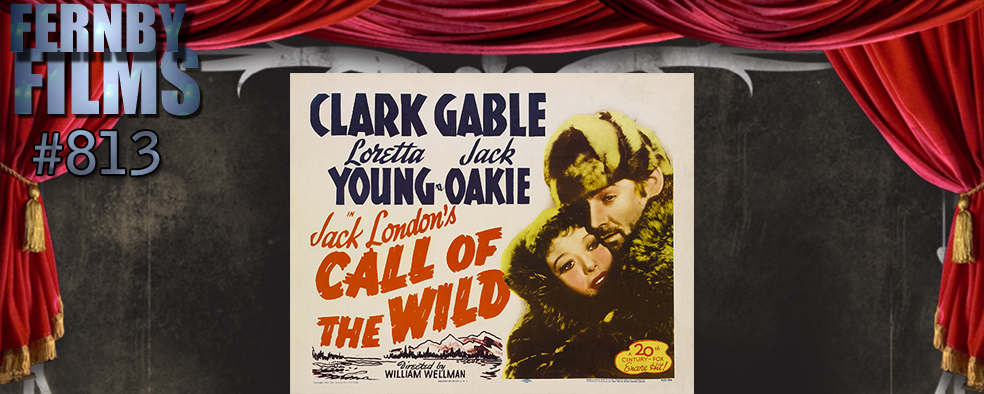


 Film Review: China Seas (1935)
Film Review: China Seas (1935) Clark Gable, My Passion For Living
Clark Gable, My Passion For Living
